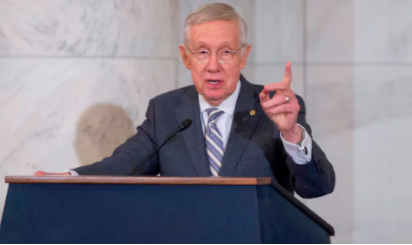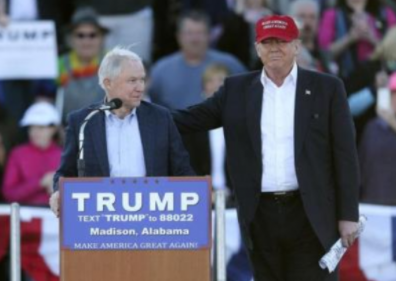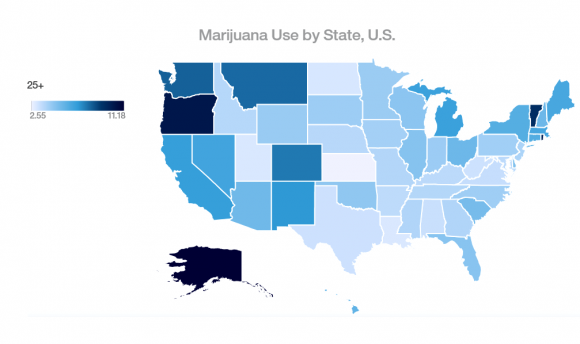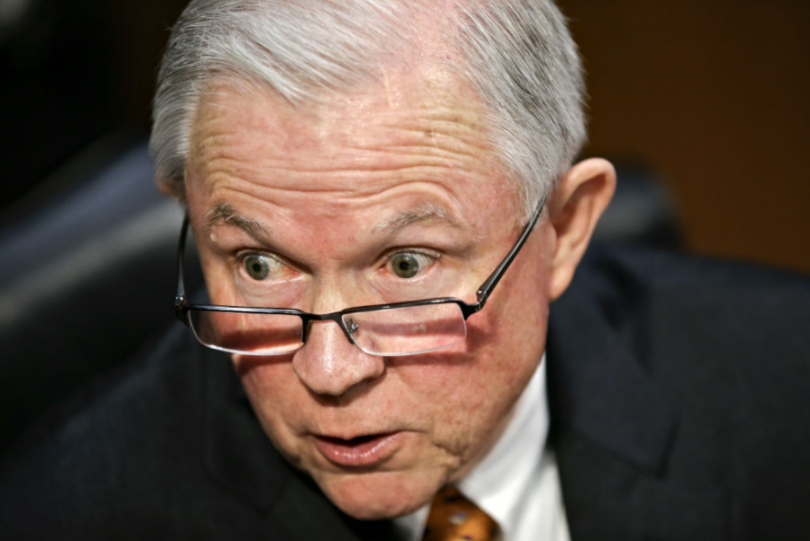aNewDomain — How do you kill the fastest growing sector in American business history?
— How do you kill the fastest growing sector in American business history?
If you’re Sen. Jeff Sessions (R-Al), Donald Trump’s pick for Attorney General, there are two answers: Happily. And easily.
This is the same politician who, at an April 2016 drug caucus, told senators, “Good people don’t smoke marijuana.
Work out the logic as a positive statement. He’s saying that millions of Americans who buy and use cannabis in the 26 US states that allow it are bad.
So, if Sessions is confirmed as Attorney General in the Senate confirmation hearings scheduled for today and tomorrow, will he cut the legalization movement off at the knees? Will he kill off legal cannabis altogether?”
All indications say yes. He will.
 Ignore the starry-eyed optimists who say it can’t happen.
Ignore the starry-eyed optimists who say it can’t happen.
Yes, legal cannabis sales totaled $6.7 billion last year. And yes, all the social indicators seem to indicate that cannabis is headed in the right direction. Traffic fatalities are down, teen cannabis use is down, and alcohol-related violence is down — and tax revenues for states that have legalized weed are way, way up.
None of that will matter to Sessions.
Sessions, after all, isn’t Trump. He’s not driven by shiny things like money or profits like Trump. And given his record, he’s not likely to be swung by statistics, crime rates or science, either.
Especially not science.
For Sessions, this is a moral issue, a crusade. And he’s been on its front lines for years.
In a recent memo to California dispensary owners that was leaked to the press, Sessions even suggested in writing that, if confirmed as Attorney General, he’d be likely to exercise his moral obligation to close them down — even raid them if he has to.
 And it would be so easy for him to do, too.
And it would be so easy for him to do, too.
Provided Trump doesn’t micromanage him in his new role, all Sessions will need is a couple of minutes and a pen to sign away the Cole Memorandum. That flimsy document is the only piece of paper that has ever stood between states’ rights to legislate cannabis and a full-out re-criminalization.
Cannabis is still illegal federally, remember. It’s classified it as a Schedule I drug, same as heroin.
As AG, Sessions will have the DEA, DOJ and the FBI at his disposal.
And there appears to be little the legal weed biz can do about it. Which makes you wonder: If the cannabis sector can’t save itself, can someone else step in?
READ: Why Sen. Jeff Sessions Is Donald Trump’s Big Flip Off to Legal Weed
And who would that be?
Trump? Unlikely. He’ll leave Sessions alone. He’s been a fiercely loyal Trump supporter and has stood with him on most, if not all, hard-line issues, including immigration, which is the big one.
 Is there another savior out there?
Is there another savior out there?
Maybe. Let’s drill down.
Could Sessions be convinced?
If cannabis business leaders want to convert the newly confirmed Attorney General to their side, they shouldn’t even bother focusing on the success of the booming new marijuana industry.
Rather, they should focus on the old-timey, common sense lessons another Prohibition taught us nearly a century ago.
During 1920s Prohibition years, you know, organized crime and alcoholism skyrocketed hand in hand. Similarly, in states like Washington and Colorado, where legal recreational cannabis is booming, officials do report less crime, safer quality products and some juicy state tax revenues.
Again, Sessions won’t be easily swung by such arguments, if at all. So far he’s steadfastly refused to believe even the most rigorous longitudinal studies into the matter, which contradict his oft-stated narrative that cannabis is a gateway drug.
Here’s what he said at a senate hearing about Colorado’s move to legalize cannabis a couple years back:
 Legal cannabis, he said, “reverses 20 years of hostility to drugs, which really began when Nancy Reagan’s started the ‘just say no’ program’ in the 1980s. That was a great, great accomplishment. Watch this video capturing Sessions’ testimony at an April 2016 Senate drug caucus on the matter.
Legal cannabis, he said, “reverses 20 years of hostility to drugs, which really began when Nancy Reagan’s started the ‘just say no’ program’ in the 1980s. That was a great, great accomplishment. Watch this video capturing Sessions’ testimony at an April 2016 Senate drug caucus on the matter.
He’s a zealot.
Sessions went on to say that, thanks to the War on Drugs and Reagan’s Just Say No initiative, “we were able to move this country from 50 percent of high school seniors using marijuana or other drugs to less than half that.
“Lives were saved,” Sessions added. “Young people’s futures were saved. And if we go back to that path, we are going to regret it.”
And wrapped up that preaching with this:
“I can’t tell you how concerning it is for me, emotionally and personally, to see the possibility that we would reverse the progress we’ve made with (the War on Drugs) and just let it slip away from us. Lives will be impacted, families will be broken up, children will be damaged because of the differences their parents have … because of marijuana. And people may be psychologically impacted for the rest of their lives … with marijuana.”
But what about states rights?
Here lies what may turn out to be legal weed’s only hope.
Remember that Sessions’ comment about Americans who smoke or use cannabis not being good? That now applies to more than half the population.
You would think that might give Sessions or those who will hold sway over him, like Trump, great pause.
 But since the Nov. 2016 presidential election, we’ve come a long way backwards, baby.
But since the Nov. 2016 presidential election, we’ve come a long way backwards, baby.
In its wake, conservative lawmakers as well as Trump’s mostly extreme-right cabinet appointees have made it clear they have no trouble legislating policy for the entire country, based on their own ideas of morality.
But wait: Isn’t forcing federal law down on states rights violate a major pillar of what the Grand Old Party historically stood for?
You bet.
Civil War today, Big Cannabis tomorrow?
For generations, the Party of Lincoln has championed the idea, often carried to extremes in anti-Civil Rights strategies, about states’ rights to set policy for the citizens who live there.
That idea was crystallized by former Confederate general Joseph Wheeler back in 1894 in a speech he gave called: “Slavery and States’ Rights.” The concept of independent state governments has been abused for so long that many in the political center and left have completely abandoned the concept, never giving it a look.
In the Trump Era, they may be turning back to claim the right to legislate their own destinies, especially regarding the legal cannabis issue.
The question is whether the new, self-styled authoritarians and moralists in Washington will let them.
Fifty laboratories in democracy
Ascendant Republican leaders considering sanctuary cities, environmental law and cannabis legalization are ready to abandon the “50 laboratories in democracy,” as Supreme Court Justice Louis Brandeis poetically described the local freedom to legislate back in 1929.
The state of California is going so far as to hire former Attorney General Eric Holder to lobby and litigate to protect its laws against Trump rollbacks in environmental regulation, civil rights and its recently passed marijuana legalization.
With Sessions prepared to make criminals of pot smokers, growers and retailers, again, the states are the logical place to make a stand.
 Look at the map of users by state (at right, click to enlarge) shows that the nation is divided on marijuana along the same geographic boundaries as the urban-rural/Democrat-Republican split.
Look at the map of users by state (at right, click to enlarge) shows that the nation is divided on marijuana along the same geographic boundaries as the urban-rural/Democrat-Republican split.
Imagine how many of these states would swing the other way if the Feds decided to take away everyone’s pot?
The doomsday scenario
In the freshly painted black and white world that Trump’s ascendancy has returned us to, there’s an alternative and perhaps more likely outcome for legal cannabis, which I’ll call the Doomsday Scenario.
In it, Sessions gets confirmed, follows his outdated data and stubborn moral judgements about legal cannabis and gets rid of the Cole Menu pretty much the minute he hangs up his office door plaque.
And again, because cannabis already is classified as a dangerous, Schedule I substance, like heroin, he doesn’t need to get a law passed or anything signed, sealed or approved to start going after sellers, growers, buyers and users right away, no matter where they are.
But the great irony here, returning to the states rights issue, is that Republican control in this scenario would end up jumpstarting extensive federalization of life and laws
It’s also true that Cannabis advocates have a broad range of potential partners across the political spectrum among people who want to minimize federal control of decisions they prefer to make themselves. Plenty of Trump supporters, too, love their weed. They also, presumably, will not love losing their ACA state healthcare once they figure out it is the same as the demonized Obamacare that whole side loves to attack.
And now a plan to save legal weed begins to take form …
And “deplorables” love their weed, don’t they?
Unclear.
But this much is true: Almost as many states that have legalized marijuana in some form voted to ratify the 18th Amendment back in 1919.
For cannabis, the momentum among voters goes the other way, strongly in support of ending prohibition. Florida, a state that went to Trump, passed its legal cannabis measure by more than 70 percent.
It’s a trend we’re seeing all over America. By and large, red states are just as green — or greener — than the blue ones.
Though the authoritarian government about to come to power doesn’t cede it to women, Americans across gender, race, religion and income lines for sure have come to realize that their neighbors can make their own decisions about what they use for their health and entertainment.
Also: Marijuana is used by patients treating pain, which is the third most expensive reason for medical spending among Americans. That desire for the pain relief and other palliative effects that cannabis seems to provide is sure to grow as the Baby Boomers, and the Xers behind them, continue to age and fall victim to cancer, MS, Parkinson’s Disease and other illnesses.
Americans support for and use of recreational cannabis use is swelling, too.
As many as 44 percent of Americans have tried marijuana, according to a 2016 Gallup poll.
Should Sessions or any other AG, for that matter, choose to suspend the Cole Memo and re-criminalize cannabis in all states, the narrow margin of victory that Trump enjoyed in 2016 could easily vanish in 2020.
That’s 35 million people who, even if they didn’t vote last year, will be motivated to vote in the future.
 And here’s another nasty side effect the Trump administration could experience should the new AG decide to suspend Cole and go after “the not good people,” as Sessions calls cannabis buyers, sellers, patients and recreational users.
And here’s another nasty side effect the Trump administration could experience should the new AG decide to suspend Cole and go after “the not good people,” as Sessions calls cannabis buyers, sellers, patients and recreational users.
And that is: What will Jeff Sessions do with them all? Jailing thousands or tens of thousands of cannabis growers, sellers and buyers is one thing.
But what if a fat chunk of the 35 million Americans who like legal weed choose to say hell no, we won’t go, or something like it.
In Jeff Sessions’ home state, Alabama, fines anyone found with marijuana $6,000 and can send them to prison for a year. Sellers face two to 20 years in prison, as to growers.
If these were used as templates for US law, thousands of prisons would need to open across the country to house people who, in many cases, are treating their ills with pot. Today’s total incarcerated population, 2.2 million, is largely the result of the War on Drugs, which Sessions heralds as one of the greatest Washington-backed efforts in his lifetime.
But it would be 15 times higher if marijuana were re-criminalized and federal laws enforced.
An end to prohibition
The nation cannot jail its way to a consensus on drug use. In the face of the heroin/opiates epidemic, there are far more pressing issues to pursue than pot, a substance used by millions and responsible for no deaths from overdose, the cannabis industry is well positioned to support legalization.
That’s why, even if they would rather not get their hands dirty in a nasty battle with the feds, states will likely be the ones to fight Sessions and any other AG that tries to get in the way of the coming end of prohibition for cannabis and the rights of states to legislate as they see fit in the means.
That will be a bizarre and surprising turn of the tables on conservative dedication to states rights.
If Sessions is confirmed and does what he has indicated for years and years in public statements and hearings he is wont to do, there will be one hell of a rebellion rising.
Back in 1986, when he was still Alabama AG, Sessions infamously joked: “The “Ku Klux Klan was OK till I found out they smoked pot.”
And all I can say after that is that Sessions and all moralist legal weed destroyers in Washington had better get ready.
This fight is going to get way nastier than they bargain for.
For aNewDomain in Seattle, I’m Mitch Ratcliffe.
Cover image: ThinkProgress, All Rights Reserved; All inside images via aNewDomain, credits within, All Rights Reserved.
More:
Here’s the April 2016 video of Sessions’ testimony at a Senate hearing on drugs and legal cannabis. This is where you’ll find his “good people don’t smoke marijuana” comment.
Sen. Sessions has said as recently as a few months ago that legal marijuana has led to an increase in teen cannabis use. But as you can see from the University of Michigan study, researchers disagree.
Univ of Michigan Study on Teen Cannabis Use by Gina Smith on Scribd













